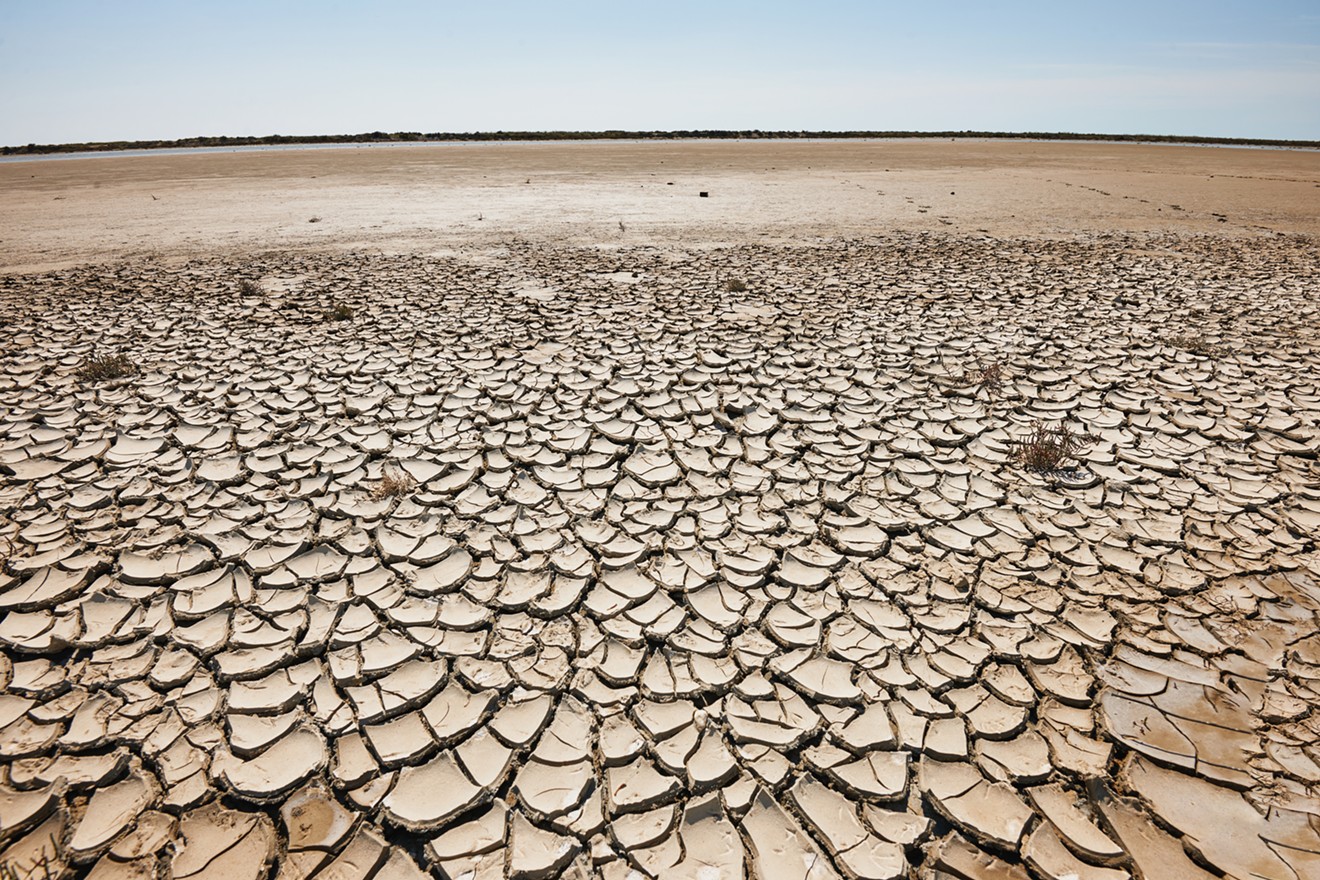Democratic lawmakers want Colorado to help fight climate change by cutting the state's greenhouse-gas emissions in half over the next eleven years, and by 90 percent by 2050. Is that enough?
It depends on whom you ask — and how you answer the question "Enough for what?"
Among the many popular misconceptions about climate change is the notion that it's a binary, either-or proposition — that the world will either stop global warming and be fine, or fail and be doomed. In reality, human activity has already warmed the climate to about one degree Celsius above pre-industrial levels, causing devastating impacts all over the world, and every further degree of warming we cause will make things worse, on an escalating scale from the merely disastrous to the outright apocalyptic.
Here in Colorado, one degree of warming has led to eighteen years of drought and aridification that has threatened water supplies, cost the agricultural sector billions and caused more frequent, more destructive wildfires. Warmer temperatures have shortened ski seasons, worsened ozone pollution in the Denver metro area and helped bark beetle infestations kill more than a fifth of all Colorado forests. As long as the world keeps emitting greenhouse gases into the atmosphere, the climate will keep getting warmer, and all of these trends will keep getting worse.
At two degrees of average global temperature rise, reported scientists with the U.N.'s Intergovernmental Panel on Climate Change last year, hundreds of millions of people around the world would be at greater risk of drought, floods, famine and forced migration. At three degrees, frequent disasters, rising sea levels, political destabilization and an explosion in extreme poverty would render the world "no longer recognizable," they wrote. Four degrees could imperil the world's food supply, threatening a global famine, and cause clouds to begin to disappear permanently. At eight degrees, most equatorial and tropical latitudes would become too hot for human habitation, and oceans would eventually rise by 200 feet, leaving two-thirds of the world's major cities underwater.
All of that is the grim, necessary context in which to judge whether House Bill 1261, Colorado Democrats' new plan to dramatically reduce the state's greenhouse gas emissions, goes far enough. On one hand, nothing is enough to stop climate change, because we're already suffering from its effects; on the other, any significant cuts at all will be enough to make future catastrophes less likely, because every fraction of a degree counts.
The bill, which was crafted by House Speaker KC Becker over the past several months and introduced last week, would commit Colorado to emissions-reduction targets of 26 percent below 2005 levels by 2025, 50 percent by 2030, and 90 percent by 2050. Crucially, it would also direct regulators at the state's Air Quality Control Commission to enact rules consistent with achieving those goals — though it also repeatedly specifies that those rules must take into account the "costs of compliance" and remain "cost-effective." Many environmental groups hailed the bill's introduction as a major step forward for climate action in Colorado.
"[HB 1261] will protect all Coloradans from the clear and present danger of climate pollution while ensuring Colorado leads the nation in building a strong and inclusive clean energy economy," said Dan Grossman, Rocky Mountain director for the Environmental Defense Fund, in a statement on Friday, March 22. "Colorado’s climate safety legislation is a trifecta to protect Coloradans’ health, to protect our environment and to secure clean energy economic prosperity – for all Coloradans."
Not everyone was so impressed. The Colorado Coalition for a Livable Climate, which includes 350 Colorado, the Colorado Renewable Energy Society and two dozen other environmental and social-justice groups, issued a statement on Friday, March 22, calling on Democratic leaders "to adopt bolder climate goals than those currently proposed in the bill."
The emissions goals set by HB 1261 are roughly in line with recommendations made by IPCC scientists, who last year urged policymakers to cut emissions 45 percent by 2030 and achieve net-zero emissions by 2050 or sooner. That would require "rapid, far-reaching and unprecedented changes to all aspects of society," they wrote, but it would likely be enough to limit warming to 1.5°C and avert many of the worst-case scenarios for future climate impacts.
But the projections made by climate scientists are neither precise nor certain; they're expressed in terms of estimates, ranges and probabilities. Last year's IPCC report defined a "1.5°C-consistent pathway" as a timeline of emissions cuts that statistical models show has an "approximately one-in-two to two-in-three" chance of keeping warming below that level. Because of that uncertainty, activists with the CCLC want Colorado lawmakers to set much more aggressive decarbonization targets — a 63 percent reduction by 2030, and net-zero emissions by 2035.
"The 2025 goal currently included in the bill plus this more ambitious 2030 goal that the CCLC is recommending together would allow Colorado to more adequately begin doing its part to keep global temperature rise below 1.5°C and address this planetary threat," the group said.
Nothing Colorado does on its own, of course, will have much of an impact on the Earth's climate; in 2010, statewide emissions were estimated at 130 million tons of carbon-dioxide equivalent, less than three-tenths of one percent of the global total. But the world must take collective action on carbon emissions in order to avoid further catastrophe, and with the Republican-led federal government actively resisting and undermining those efforts, advocates for strong climate policy have increasingly turned to cities and states to pick up the slack.
By targeting ambitious emissions cuts, advocates hope, Colorado can help lead the global transition to a decarbonized economy and become a model for other states and countries around the world — a goal explicitly endorsed by HB 1261, which declares that the state should "exercise a leadership role...in national and international efforts to reduce greenhouse gases." But with devastating climate impacts beginning to be felt even as global emissions continue to rise, activists with the CCLC and other groups will continue to pressure Governor Jared Polis, lawmakers and state regulators to aim higher.
"Our state needs to adopt bolder science-based goals that would establish Colorado as a true climate leader, for the sake of ourselves and future generations," said the coalition's statement.
[
{
"name": "Air - MediumRectangle - Inline Content - Mobile Display Size",
"component": "12017618",
"insertPoint": "2",
"requiredCountToDisplay": "2"
},{
"name": "Editor Picks",
"component": "17242653",
"insertPoint": "4",
"requiredCountToDisplay": "1"
},{
"name": "Inline Links",
"component": "18838239",
"insertPoint": "8th",
"startingPoint": 8,
"requiredCountToDisplay": "7",
"maxInsertions": 25
},{
"name": "Air - MediumRectangle - Combo - Inline Content",
"component": "17261320",
"insertPoint": "8th",
"startingPoint": 8,
"requiredCountToDisplay": "7",
"maxInsertions": 25
},{
"name": "Inline Links",
"component": "18838239",
"insertPoint": "8th",
"startingPoint": 12,
"requiredCountToDisplay": "11",
"maxInsertions": 25
},{
"name": "Air - Leaderboard Tower - Combo - Inline Content",
"component": "17261321",
"insertPoint": "8th",
"startingPoint": 12,
"requiredCountToDisplay": "11",
"maxInsertions": 25
}
]












